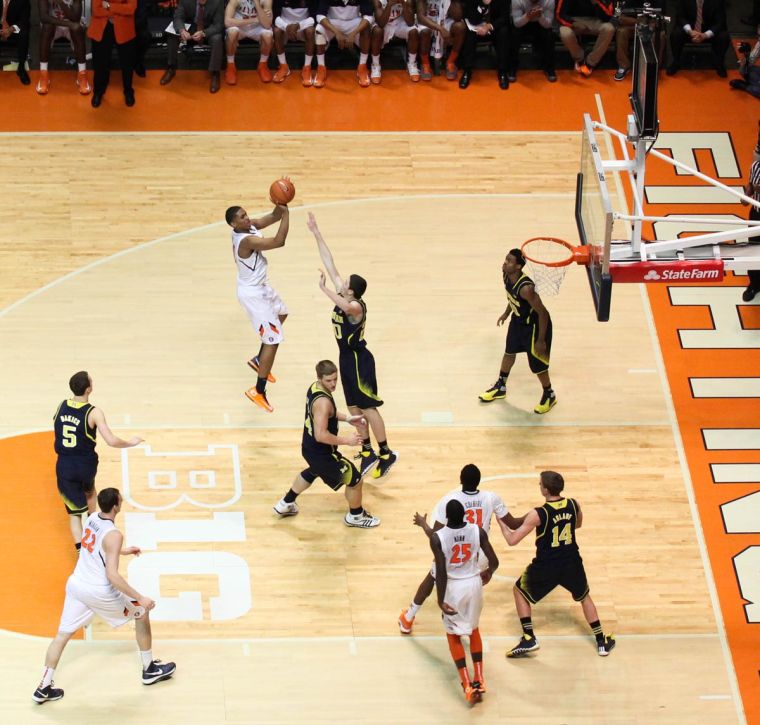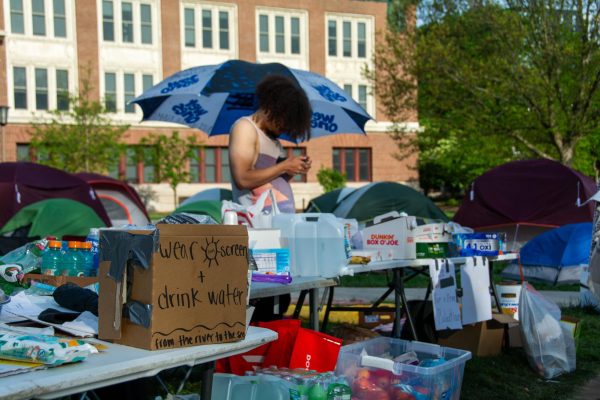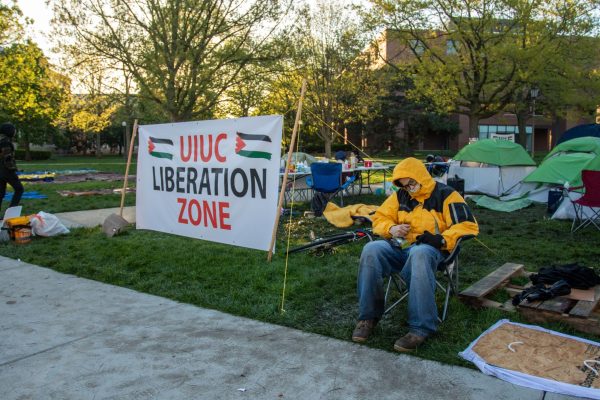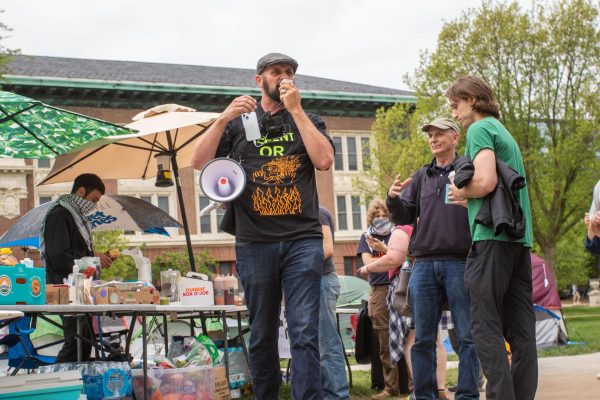Deeper than the stitching: No. 21 more than a number for Hill
March 18, 2014
No. 21 on the Illinois basketball team goes deeper than the stitching on the uniform. When freshman Malcolm Hill pulls his jersey over his head before each game, he is fulfilling a lifelong dream to wear No. 21 for the Orange and Blue.
But it’s not his dream he’s fulfilling; it’s Jeremiah Radford’s.
Radford, like Hill, was raised in the St. Louis area and attended high school in Belleville, Ill., a town of 44,000 located 18 miles east of St. Louis. At Belleville East High School, Jeremiah and Malcolm became friends. They talked of together making a journey to compete for Illinois — Malcolm in basketball, and Jeremiah a year later in football. But Jeremiah’s dream was deferred when a battle with cancer got in the way.
Only Malcolm made it to Illinois, but he brought Jeremiah’s legacy with him in the form of the jersey he had always wanted to wear — the orange and blue No. 21.
Jeremiah DeJon Radford was born on March 5, 1996 to Felicia Radford and Jeremiah LaMarr Radford. He was an only child until age 9, when his twin siblings Jada and Jaden were born. Growing up, Jeremiah was full of energy and showed an immediate love for the game of football.
Get The Daily Illini in your inbox!
“Ever since he came into this world, all he knew was football,” Felicia said.
Jeremiah started playing with the Belleville Knights peewee football team when he was 6 years old. His favorite player was No. 21 of the San Diego Chargers, LaDainian Tomlinson. He took No. 21 on every team he played for going forward. If he couldn’t get it, his mother said, it was going to be a problem.
It was football that sparked his affection for another hobby as a child: weight lifting. He became a workout fanatic at about age 10 when he began experimenting with weights in order to build his body for the sport he loved.
As he entered his teenage years, he began doing three workouts a day, a ritual that included hundreds of pushups before bed. But football remained his true passion.
It was football that brought Jeremiah to the University of Illinois during the summer before his freshman year of high school. He attended the Fighting Illini football camp in 2010, and it left a lasting impression on him.
“He was just in love,” Felicia said. “He took pictures of the field and had them hanging in his room.”
The camp made Jeremiah an Illini fan for life. After only a week on the Illinois campus, he decided he would go to college at Illinois and play football for the Illini. Attending Illinois became one of his main goals, but according to his mom, it was just a stepping stone toward his ultimate objective.
“He used to tell me: ‘I can’t wait until I make it to the NFL, mom, so you don’t have to work anymore,’” she said.
Before any college and NFL dreams could be fulfilled, however, Jeremiah enrolled at Belleville East High School as a freshman in 2010. Mark Larsen, an assistant football coach at East, said his work ethic stood out.
“I noticed him right away because he was very aggressive, very hard-nosed,” Larsen said. “He was one of our better football players his freshman year.”
Jeremiah stood out playing freshman football at fullback and cornerback. It was during that freshman season that he discovered a dime-sized bump on his right wrist. The bump was a warning sign; his body’s red flag telling him that all was not well.
By December 2010, the bump had grown to the size of a golf ball, becoming too big to ignore. Jeremiah went to a pediatrician for examination, who referred him to a specialist at Cardinal Glennon Children’s Hospital in St. Louis. Test results showed the unthinkable, and every parent’s worst nightmare: Jeremiah had cancer.
He was diagnosed with an aggressive form of soft-tissue sarcoma, a disease 900 children in the U.S. are diagnosed with per year. Doctors gave Felicia several treatment options, one of which included removing his right arm.
“We were like, ‘No. He doesn’t want his arm removed,’” Felicia said. “The doctors felt comfortable they could remove the tumor in his arm with clear margins and go through chemotherapy. And that’s what we did.”
Jeremiah proceeded to endure six months of chemotherapy and radiation treatment at Cardinal Glennon, beginning in January 2011. Attending school regularly was impossible, but his story was well known among the students and staff at East. High school friends crowded his hospital room for visits.
At the time, Malcolm was being recruited by Illinois and one year older than Jeremiah. He took notice of Jeremiah’s illness but didn’t approach him at first.
“I didn’t really talk to him because I’m a shy person,” Malcolm said. “He had cancer, and I didn’t really know what to say to him at first. He wore this hat at school because he was bald, and almost everybody knew him.”
Felicia urged Jeremiah to fight his illness and to not get down on himself. She and her son shared a strong faith in God, as well a positive attitude that He would see them through and that they would make the best of their situation.
“Don’t feel sorry for yourself,” she told Jeremiah. “Don’t start feeling sorry for yourself, because that’s when you will let the disease take over you.’”
As a mother, she tried to maintain a sense of normalcy when Jeremiah was able to be home, giving him chores and making sure he kept up with his homework. But it was his dedication to lifting weights and football that gave him a consistent distraction from his illness.
He continued his workout regimen, lifting whenever he could. He itched to get back on the field and even attended a football camp at nearby McKendree University during treatment. He ate huge meals during his chemo sessions in fear of losing his bulk, even though most cancer patients struggle to eat anything at all due to severe nausea caused by the chemo.
His Twitter avatar to this day shows him shirtless, and his body looks like it had been sculpted in the weight room rather than ravaged by cancer. The only indicator of his illness was his bald head.
Finally, the six-month treatment period came to an end. Felicia and Jeremiah went in for a checkup, hoping for good news. They got just the opposite.
The chemo and radiation treatments hadn’t even touched the cancer. It had metastasized and spread to his lungs.
With the new discovery, doctors brought grave news. They told Felicia that her son only had three months to live. She refused to accept it, and she refused to tell her son that doctors had given him an expiration date. She prohibited his doctors from disclosing this information to him in fear that he would quit fighting the disease.
Jeremiah kept fighting, and the three months came and went. More treatment followed as he transitioned into his sophomore year, including two lung surgeries to treat the spreading cancer. The severity of the illness prevented him from playing football his sophomore year. A side effect of the treatments caused the skin on his hands to deteriorate and burn, resulting in intense pain and discomfort. It didn’t faze Jeremiah. He peeled the skin off his hands, wrapped them in gauze and continued his intense workouts.
“I was like, ‘Jeremiah, are you serious? Come on,’” his mother said.
He stayed close to the Belleville East football program through his teammates and coaches. He was named an honorary captain for a Lancers varsity game, which was played at the St. Louis Rams’ Edward Jones Dome. Larsen kept in contact with Jeremiah and would regularly take him out to dinner.
“We would go out to eat and talk for an hour or two to get him out of the house and to feel halfway normal,” Larsen said. “He wanted to talk football all the time. He always wanted to know how the team was doing.”
Around the same time, Malcolm committed to Illinois, and Jeremiah was naturally excited about the decision. The best basketball player at his high school would be playing for his favorite college team.
With an Illini connection to talk about, the two gradually became friends through Xbox Live, where they could chat while playing each other in NBA 2K. Even though Jeremiah rarely attended school, he caught up with Malcolm regularly through texting and online. While Jeremiah was sidelined for his sophomore football season, Malcolm’s numbers skyrocketed during his junior year in basketball, as he averaged 21.3 points and 9.6 rebounds for the Lancers.
In the middle of Malcolm’s big season, Jeremiah and his family received some encouraging news of their own. Following an MRI and CT scan on his chest in December 2011, Jeremiah’s doctor was confident he was on his way to being cancer-free. He had not only out-lived his three-month prediction, he had seemingly beat the cancer altogether. His doctor released him to go back to school in January.
But his mother could tell something was still wrong. Jeremiah was complaining of back pain but attributed it to working out too hard.
She wasn’t so sure, and she took him in for another CT scan in late January.
Test results showed that the cancer had returned, and it was more aggressive than ever. Doctors discovered two nodules on his lungs, and his lungs were beginning to fill with fluid. Drastic steps would have to be taken to save his life.
Despite the setback in his condition, Jeremiah found time to chat with Malcolm on Xbox Live before his upcoming procedures. Up to that point, Malcolm had scored at least 30 points in multiple games for the Lancers, but Jeremiah challenged him to do better.
“Why don’t you score 40 points in your next game?” Jeremiah said.
Malcolm accepted the challenge. “All right, I’ll score 40 points for you.”
Jeremiah had another request, knowing he was facing a critical upcoming surgery.
“Wish me luck on my surgery,” he said to Malcolm. “Once I have this surgery, I’ll be cured from cancer. I’ll kill it in high school; I’ll have an offer from the University of Illinois. We’re gonna go there together. You’re gonna go to the NBA, and I’m gonna go to the NFL. We’re gonna do big things.”
Malcolm wished him luck. The next day was Super Bowl Sunday, Feb. 5. When Jeremiah woke up, he could hardly breathe. He was rushed back to Cardinal Glennon, and following more tests was able to watch the New York Giants beat the New England Patriots in the Super Bowl. He wanted to watch it at home but stayed in the hospital, where he would have surgery on Feb. 7.
Jeremiah’s father was out of town and unable to be with him, but his mother hugged him like she usually did before his surgeries and told him she would see him when he came out. But this time, her son said something out of the ordinary, and it startled her.
“Mom, I’m tired,” he said.
He was put under anesthesia for the surgery, and he never woke up.
He suffered a stroke when he went under and started getting cancerous lesions on his brain.
“It took him very fast,” his mother said. “We never expected it. We kind of took it for granted, because this kid would go through lung surgeries and be up walking around the same day.”
Jeremiah Radford died on Feb. 8, 2012, at 15 years old. It was Jaden and Jada’s sixth birthday.
Felicia was in shock.
She decided not to tell Jada and Jaden about their brother’s passing, so they could enjoy their birthday. Meanwhile, the hospital was packed with relatives, friends and her co-workers. When she told her kids the news the next day, their response made her proud.
“That’s OK, mom, he’s in heaven. God just needed him more than we did.”
The Belleville East community was devastated when the news broke.
“Everyone was sad, everybody loved him,” Malcolm said.
East’s next basketball game was Friday, Feb. 10 against O’Fallon High School. Students and players decided to dedicate the game to Jeremiah. Fans wore orange and blue, as opposed to the school’s traditional navy blue and sky blue, in tribute to his love for the Illini.
Malcolm knew he had a promise to keep. What had been a playful bet between friends became a goal he was determined to reach: score 40 for Jeremiah.
The game didn’t start well. Playing with heavy hearts, the Lancers fell behind early, trailing 31-25 at half.
When the deficit got to double-digits in the third quarter, Malcolm led an inspired comeback.
“It was like a miracle happened,” Malcolm said. “We just went on this rampage and came all the way back.”
All of a sudden, the game was nearly over. Belleville led by three, and Malcolm had 38 points. He was fouled and was sent to the line for two free throws. Forty was within reach.
“It was the most pressure I’ve ever felt at the free throw line in my high school career,” he said.
He stepped to the line, and the first free throw went up.
“Rattle, rattle, and it went in.”
He drained the second free throw as well for his first career 40-point game. The game ended in a 59-53 Belleville East victory. Orange-clad students rushed the floor to celebrate, yelling Jeremiah’s name. Overcome with emotion, Malcolm fell to the floor in tears.
Felicia was planning his funeral and wasn’t able to attend the game. She heard about the school’s tributes, the pictures of her son on the gym’s walls and Malcolm’s superhuman performance.
“It just made me cry,” she said after watching the end of the game on YouTube. “I’m so proud (of Malcolm). I actually brag on him like he’s my son. I know he’s going to go a long way.”
The victory helped the community heal, and they’ve been healing ever since. The Belleville East football program retired his No. 21 jersey. A Facebook page honoring Jeremiah has more than 700 likes, and it includes tribute videos made by classmates. And now, more than two years after Jeremiah’s death, Malcolm’s silent tribute has kept his spirit alive.
“I wear 21 for just for him; this is his favorite University,” Malcolm said. “It reminds me no matter what adversity you go through to always work hard because good things will happen to you.”
If given the opportunity to talk to Jeremiah today, Malcolm would have a simple message for his friend: Thank you.
“I have nothing to complain about. I have so many good things going for me. I wasn’t grateful until I met him,” Malcolm said.
“Thank you for teaching me how to be grateful for everything I have.”
Even though her son is gone, Felicia still takes comfort in their memories and the connection they share.
“I feel like he truly was an angel that God sent to me,” she said. “I wasn’t meant to have him but for the 15 years that I got. I still feel like he’s here, not physically, but he will always be with me mentally. He was just that awesome.
“And I feel like as long as I hold onto that, he’ll never die.”
Alex can be reached at [email protected] and @aroux94.







